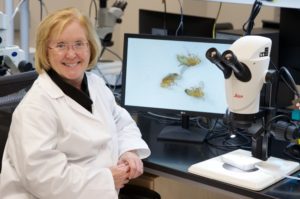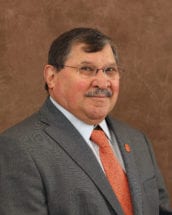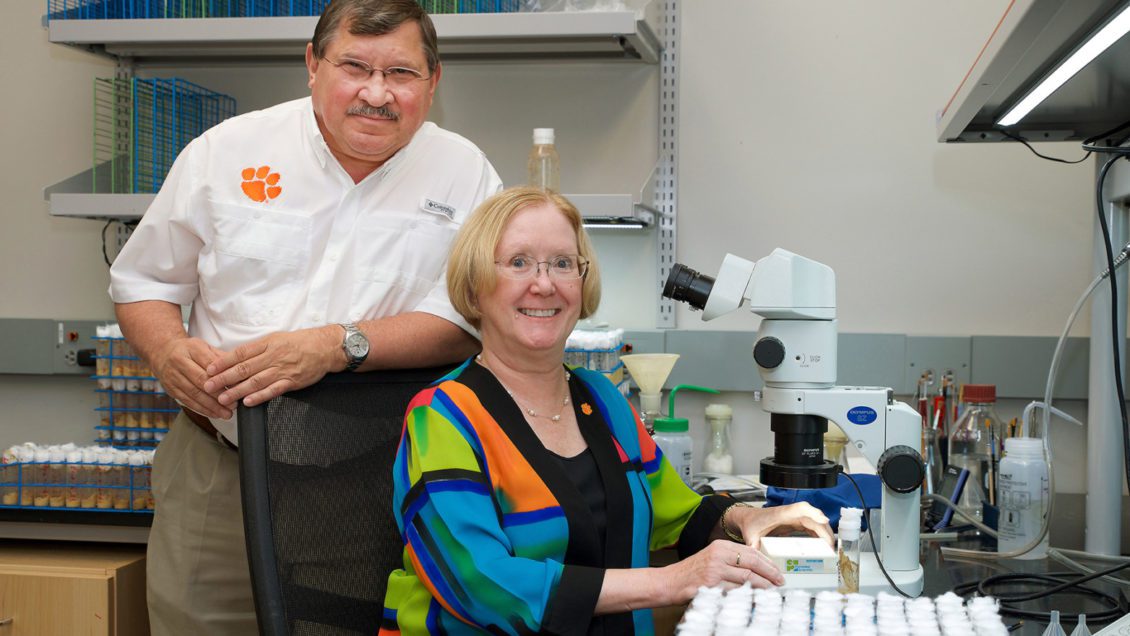Scientists gathering at the Clyde V. Madren Center for the 2022 Clemson Symposium on Quantitative Genetics this weekend have two traits in common.
They’re some of the leading experts in the fields of genetics and genomics and will present plenary lectures about their research. They’re also former students and colleagues of Trudy Mackay and Robert Anholt of the Clemson University Center for Human Genetics.
“Trudy and Robert have made landmark discoveries. They have won major awards and been elected to many honorific societies. Still, I think their biggest contribution has been training the next generation of scientists,” said Wen Huang, one of the symposium organizers.

Huang studied under Mackay and Anholt for six years at North Carolina State University. He is now an assistant professor in Michigan State University’s Department of Animal Science.
“Trudy and Robert are brilliant scientists. They can do a lot, but they cannot do everything. However, Trudy and Robert have trained many scientists who can go on to make their own discoveries. So, their influence is more continuous and sustained because their trainees can continue the work Trudy and Robert started and also start new things,” Huang continued.
Mackay is the director of the Clemson University Center for Human Genetics. Anholt is the Provost’s Distinguished Professor of Genetics and Biochemistry and the College of Science’s Director of Faculty Excellence.
Leading authority
Mackay is recognized as one of the world’s leading authorities on the genetics of complex traits and for groundbreaking research that reveals the genetic and environmental basis of human disease. She pioneered a research model based on the common fruit fly — about 70 percent of the fruit fly genome has a human counterpart. She uses her model to define pathways that can lead to treatment for terminal and mental illnesses that affect people globally and have so far stumped doctors and scientists.
She is a recipient of Trinity College’s Dawson Prize in Genetics, awarded to geneticists of international prominence. Mackey is a member of the National Academy of Sciences. She is the first professor at Clemson to become a member of the American Philosophical Society, the oldest learned society in the United States, founded by Benjamin Franklin in 1743. She is a recipient of the 2016 Wolf Prize for Agriculture.
Mackay developed the Drosophila Genetic Reference Panel, which has 1,200 fly lines with fully sequenced genomes that researchers worldwide use.
Numerous awards
During his career, Anholt has received numerous awards and special recognitions for his work. He received the Martin Kamen Award for most outstanding doctoral thesis in 1982 from the University of California, San Diego. In 2000, he received the Faculty Resource Development Award, College of Agriculture and Life Sciences, N.C. State. In 2011, he was named a top referee by the Proceedings of the Royal Society B: Biological Sciences. In 2016, he was honored with the Alexander Quarles Holladay Medal for Excellence at N.C. State. From 2016-19, he was conferred an honorary professorship by China’s Beijing Forestry University.

In addition, Anholt is a member of the Sigma Xi Scientific Research Honor Society and a fellow of the American Association for the Advancement of Science. He is credited, with others, for three inventions relating to his research.
They came to Clemson and CHG from North Carolina State.
Susan Harbison studied under Mackay, and Anholt was a mentor. Both have had an enormous impact on her career, Harbison said. She is a senior investigator and chief of the laboratory of systems genetics at the National Heart, Lung, and Blood Institute at the National Institutes of Health, where she studies sleep and circadian behavior using flies as a model system.
“While her colleagues were taking the usual classical reductionist approaches, Trudy instead applied quantitative genetics to the study of complex traits,” she said. “As DNA and RNA sequencing technologies have advanced, Trudy has integrated these improvements into a holistic approach to understand the persistence of genetic variation in complex traits. It has been a real pleasure to witness her achievements over the years. Her work suggested to me new approaches to understand the function of sleep—a classic mystery in biology—and influenced the career trajectories of her other students as well.”
Of Anholt, Harbison said, “Robert has been at the forefront of the genetics of behavior, particularly chemosensation, for many years. Using a novel approach, he also furthered our understanding of phenotypic plasticity in response to changing environments. Robert developed an outstanding training and mentoring program while he was Director of the W. M. Keck Center for Behavioral Biology, one that fostered my own career development.”
Jeff Leips, who spent four years as one of Mackay’s postdoctoral researchers, said Mackay and Anholt have continued to support his career long after he left their lab.
“I learned so much about what it took to be a proficient and productive scientist,” said Leips, who will discuss the role of age-specific genetics on aging at the symposium.
The College of Science pursues excellence in scientific discovery, learning, and engagement that is both locally relevant and globally impactful. The life, physical and mathematical sciences converge to tackle some of tomorrow’s scientific challenges, and our faculty are preparing the next generation of leading scientists. The College of Science offers high-impact transformational experiences such as research, internships and study abroad to help prepare our graduates for top industries, graduate programs and health professions. clemson.edu/science
Get in touch and we will connect you with the author or another expert.
Or email us at news@clemson.edu

